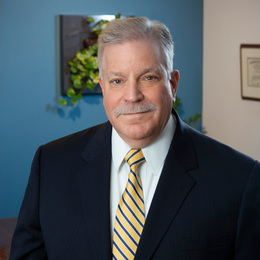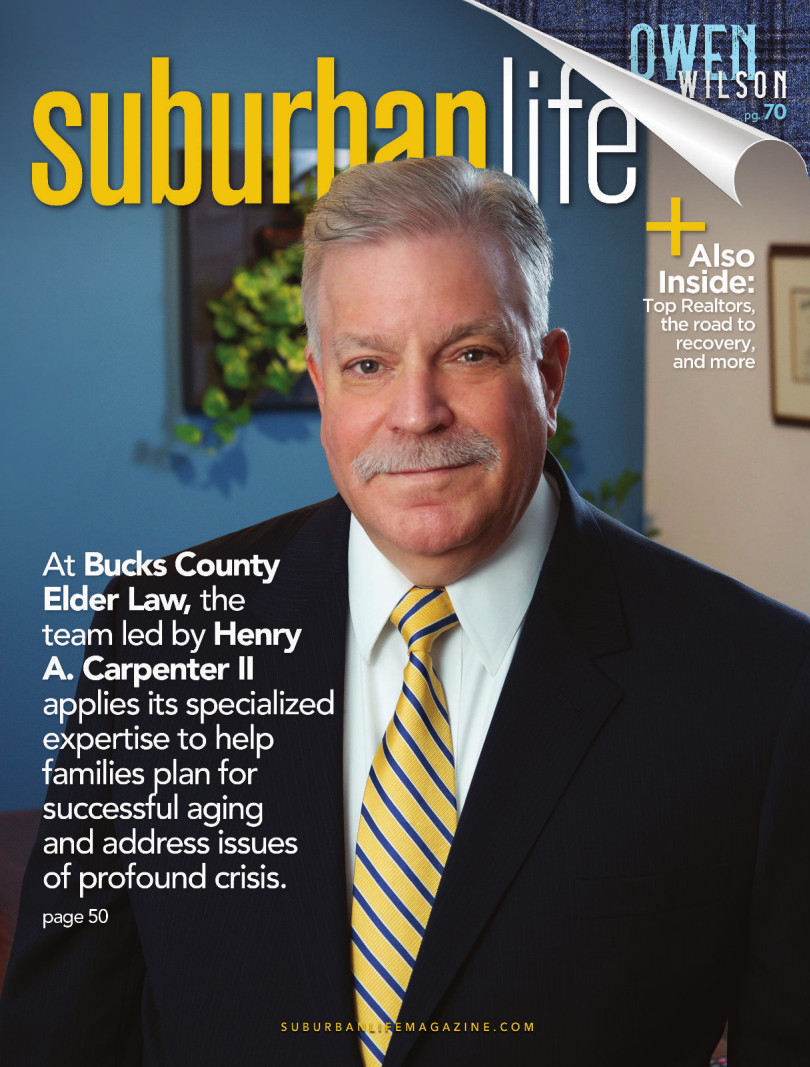
An Advocate for Seniors
At Bucks County Elder Law, the team led by Henry A. Carpenter II applies its specialized expertise to help families plan for successful aging and address issues of profound crisis.
Henry A. Carpenter II, CELA, takes great satisfaction in helping people plan for the future, protect their families, and find solutions for the issues confronted by seniors. As a Certified Elder Law Attorney and the founder of Yardley-based Bucks County Elder Law, Henry has spent the balance of his legal career guiding clients through uncharted territory, often in situations rife with fear and uncertainty.
Bucks County Elder Law focuses exclusively on aspects of Elder Law such as estate planning, asset protection, Long Term Care planning, Medicaid planning and special needs planning. Henry and his legal team specialize in Life Care Planning, a holistic approach to helping families address the challenges associated with the aging or chronic illness of a loved one.
“Most people have never had to contend with the kinds of issues we handle every day,” Henry says. “Often their natural instinct is to do the wrong thing, and that can create a downward spiral. We’re here to prevent that from happening.”
In addition to his work with the firm, Henry is a past Chairman of the Elder Law Section of the Pennsylvania Bar Association, which he continues to serve. In 2020 the Bar Association honored Henry with the “Excellence in Elder Law Award” for his professional efforts in the field of Elder Law, his contributions to the Bar, and his service to the elderly. He is also a member of the National Academy of Elder Law Attorneys, the National Elder Law Foundation, and the Life Care Planning Law Firms Association.
We spoke with Henry about the ins and outs of Elder Law, the growth of the firm he founded nearly 30 years ago, and the actions individuals can take now to protect themselves and their families well into the future.
Q&A
Elder Law seems like one of those areas of the law where people don’t know what’s involved until they need help from someone like you. Can you give us a sense of the cases you work on most often?
Elder Law brings together a number of areas of law, including public benefits/Medicaid, estate planning, asset protection, and contract law. The clients who come into our office range in age from 50 to 103. Some people come here in a moment of profound crisis, and others come to us to do some advance planning. Maybe they’re coming to see us at the onset of a health issue or a cognitive issue, or maybe they’re just coming in to make sure all their paperwork is in place.
Elder Law seems like one of those areas of the law where people don’t know what’s involved until they need help from someone like you. Can you give us a sense of the cases you work on most often?
Elder Law brings together a number of areas of law, including public benefits/Medicaid, estate planning, asset protection, and contract law. The clients who come into our office range in age from 50 to 103. Some people come here in a moment of profound crisis, and others come to us to do some advance planning. Maybe they’re coming to see us at the onset of a health issue or a cognitive issue, or maybe they’re just coming in to make sure all their paperwork is in place.
The basic philosophy of our practice is that every client is an individual with hopes, plans, and fears, all of which must be considered in planning. If someone is facing Long Term Care issues, either in their home or in a facility, we can analyze their situation from a legal context and a practical context, and structure a plan that puts them in the best possible position vis-à-vis care and asset protection for their spouse and family members. After meeting with people for the first time, we often hear, “I’m so glad I came in here; it’s not as bad as I thought.” We’re here to stabilize unstable situations and help people get back in control, not feeling like a pinball bouncing from crisis to crisis.
Why did you choose to specialize in this area of the law?
I never had a choice. When I was four years old, my great-aunt Chrissie asked me, “What do you want to do when you grow up?” I said, “I want to be a lawyer.” She said, “Like Perry Mason?” I said, “No, I want to write documents for people and do things that help people out.” I was certainly aware of Perry Mason growing up, but I must have seen something else along the way that struck me and made me want to go down this path. I did a lot of different things in my early legal days, including high-end mergers and acquisitions with New York law firms, but I wanted to make more of a difference in the lives of individual people. I decided to go out on my own, hung out a shingle, and never looked back.
I never had a choice. When I was four years old, my great-aunt Chrissie asked me, “What do you want to do when you grow up?” I said, “I want to be a lawyer.” She said, “Like Perry Mason?” I said, “No, I want to write documents for people and do things that help people out.” I was certainly aware of Perry Mason growing up, but I must have seen something else along the way that struck me and made me want to go down this path. I did a lot of different things in my early legal days, including high-end mergers and acquisitions with New York law firms, but I wanted to make more of a difference in the lives of individual people. I decided to go out on my own, hung out a shingle, and never looked back.
I like that every client has a story that is specific to them. There’s some sadness in their stories, because life can be challenging at times, but there is also a lot of happiness and love in those stories. I’m at my happiest when I’m helping someone. So many people come into our office in tears, but they leave here realizing it’s not all gloom and doom. People leave our office in a better position, legally and philosophically. How can you not love doing that?
How has the firm grown since you founded it?
I started the firm in 1994 as a boutique practice, and Elder Law is still the only thing we do. The firm has grown to include additional attorneys and a team of paralegals, each specializing in a different area—estate administration, public benefits, and estate planning. We also have a team of Care Advocates; I refer to them as social workers on steroids. I think like a lawyer, in that I look at each situation with an eye toward a legal solution, whereas our Care Advocates view the situation from the care side, so it’s a nice balance. They have been a fantastic addition to the practice. Then there’s Rex, our 14-year-old greeter and emotional support dog.
I started the firm in 1994 as a boutique practice, and Elder Law is still the only thing we do. The firm has grown to include additional attorneys and a team of paralegals, each specializing in a different area—estate administration, public benefits, and estate planning. We also have a team of Care Advocates; I refer to them as social workers on steroids. I think like a lawyer, in that I look at each situation with an eye toward a legal solution, whereas our Care Advocates view the situation from the care side, so it’s a nice balance. They have been a fantastic addition to the practice. Then there’s Rex, our 14-year-old greeter and emotional support dog.
What can people do now, before they need help, to avoid emergencies down the road?
Every once in a while, people need to do a self-evaluation. When you get to a point in life where you have something to worry about, you should do some planning. I always tell everyone that it’s critically important to have the basic documents in place before you need them: a Will, a Durable Financial Power of Attorney, a Medical Power of Attorney, and a Living Will.
Every once in a while, people need to do a self-evaluation. When you get to a point in life where you have something to worry about, you should do some planning. I always tell everyone that it’s critically important to have the basic documents in place before you need them: a Will, a Durable Financial Power of Attorney, a Medical Power of Attorney, and a Living Will.
We basically have two types of clients. First are the ones who come here early to put together a Life Care Plan and preserve their estate; maybe it’s an older couple who comes in saying they’re both doing fine, but they’re noticing the husband is missing a step or the wife is starting to show signs of cognitive decline. Then there are the people in crisis who have just left a loved one at the hospital and realize that person is going to a nursing home. They’re desperately worried about their loved one, but they’re afraid they will lose everything. There are still actions we can take at that stage, but doing some advance planning can prevent adding stress in an already stressful situation.
In addition to helping people directly, you also educate people through workshops and other tools. Why is that kind of outreach important to you?
Our goal is to get people thinking about the future. We do web-based workshops every other week, and we call them workshops intentionally, because they are instructional and educational rather than trying to generate clients. In fact, I’d say 80 to 90 percent of workshop attendees have already signed up to work with us, and the workshops introduce them to the concepts and issues we’re going to be talking about. It’s like an additional free meeting.
Our goal is to get people thinking about the future. We do web-based workshops every other week, and we call them workshops intentionally, because they are instructional and educational rather than trying to generate clients. In fact, I’d say 80 to 90 percent of workshop attendees have already signed up to work with us, and the workshops introduce them to the concepts and issues we’re going to be talking about. It’s like an additional free meeting.
We also do a radio show called “Senior Legal Strategies” every Tuesday morning on WBCB 1490 AM/107.3 FM. It’s just another tool to spread the word and get people thinking about the issues that we will all have to deal with in one way or another. In my view, a little preparation can prevent a lot of problems down the line.
Bucks County Elder Law
Makefield Executive Quarters
301 Oxford Valley Road, Suite 101B
Yardley, PA 19067
(215) 493-0727
buckscountyelderlaw.com
Makefield Executive Quarters
301 Oxford Valley Road, Suite 101B
Yardley, PA 19067
(215) 493-0727
buckscountyelderlaw.com
Photograph by Alison Dunlap
Published (and copyrighted) in Suburban Life magazine, March 2022.



